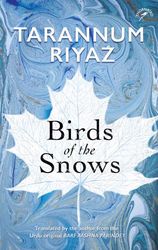Award-winning Urdu writer, poet, essayist and translator Tarannum Riyaz succumbed to Covid-19 during the second wave of the pandemic. In her writings and her persona, she displayed a gentle, soft and understated elegance. Known for her portrayal of women and the predicaments they face in a male-dominated society, she trod the fine line between feminist and feminine poetry. As a short story writer and novelist, she made her mark among the post-modern wave of Urdu writers who rose to prominence in the 1990s. Birds of the Snows is Riyaz’s own translation of her much-acclaimed Urdu novel, Barf Ashna Parindey, first published in 2009. Soft-spoken and modest, there was a dheemapan (mildness) in her lehja (tone), which successfully comes through in the English translation.
A far cry from the harshness and rhetoric that surround much of the writings on Kashmir, Birds of the Snows reads like an elegiac swan-song to a lost childhood and to a once-idyllic land now mired in violence and terror. “My Kashmir,” writes Riyaz. “The land of soft-spoken, humble, handsome people, of intellectuals, artists and craftsmen. The land of silk, pashmina, saffron and lush green meadows. The home of mountains, valleys and waters. A paradise on earth with a 5,000-year-old documented history that has few parallels in the world.”
Generously studded with history and anecdotes, mythology and folklore as well as fragments of songs and poetry, this elegantly sprawling novel evokes a layered and pluralistic past. There are vivid descriptions of changing seasons and hauntingly beautiful landscapes; of the fruits and vegetables that were once “native” and plentiful in the author’s childhood, but have since disappeared or been replaced with higher yielding hybrid varieties; and of old customs and traditions which are dying in the face of modernity.
Sheba, the novel’s compassionate and gentle protagonist, dedicates her life to looking after her ailing professor, forgoing the ‘conventional’ love and happiness sought by most young women, especially those from conservative societies. Choosing duty, a sense of responsibility and a hunger for education over a traditional ‘happily ever after’ with the man she loves, she ploughs a lonely furrow. Her fraught relationship with her older sister, Baaji; her family’s fight for property; and the changing socio-economic relationship between feudal families like hers and the kashtgars who once tilled the land and provided cheap labour form the vast canvas against which several smaller ‘back stories’ are painted like cameos, each connected inextricably with Kashmir—the moral centre of the novel’s universe.
Militancy and terrorism briefly raise their ugly head half-way through the otherwise serene landscape of Birds of the Snows. Here, too, Riyaz is never strident or partisan. Her humanism makes her cry out in anguish when she sees children take up arms. “It was hard to say who was behind the bloodshed of this militancy working in the garb of ‘Struggle for Freedom’,” she writes. “There were surely some other realities behind the apparent truth of the borders, religious polarisation and unemployment, none of which were easy to comprehend. Some horrendous reality, backed perhaps by the vast resources of Capitalism…. What about the peaceful majority who only want to carry on with their quiet lives?”
This gentlest of authors and ardent but soft-spoken advocate of ‘vaadi ka culture’ (the culture of the valley) makes the loudest plea for her bloodied, benighted land: Let peace prevail!
Birds of the Snows
By Tarannum Riyaz
Published by Niyogi Books
Price Rs695; pages 498


